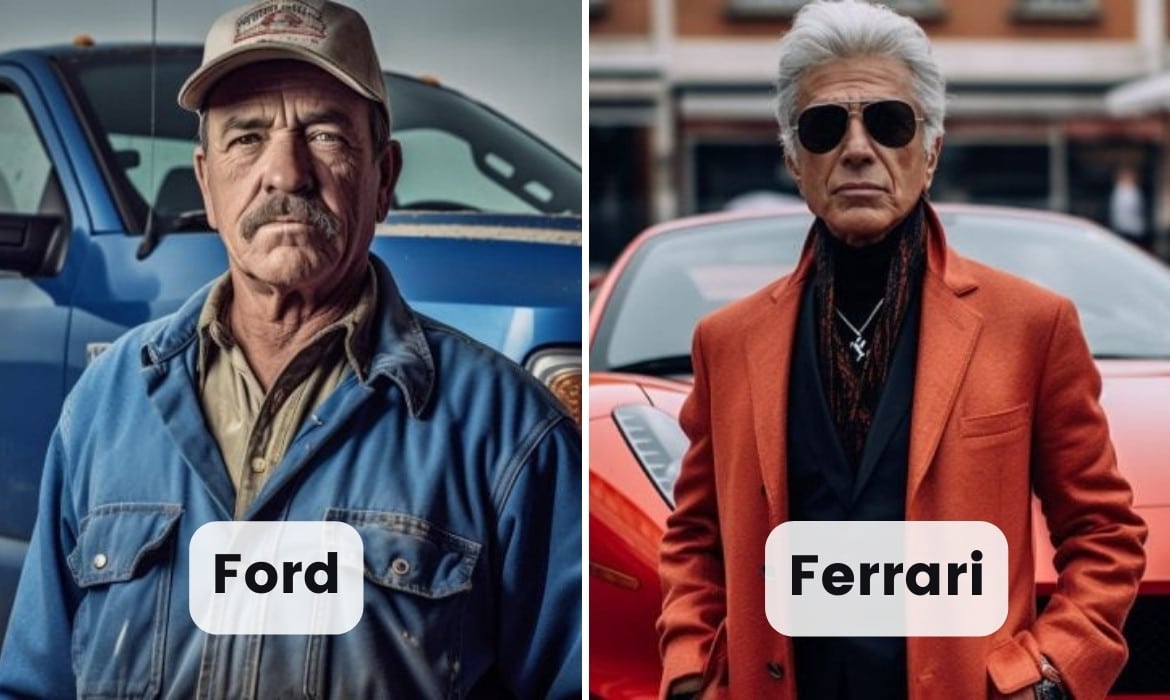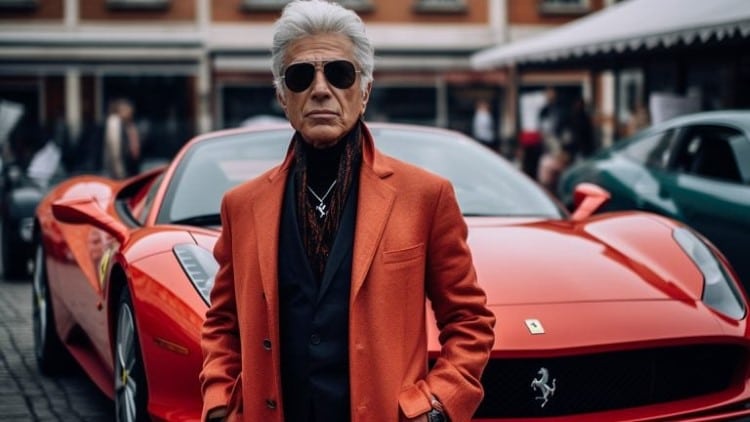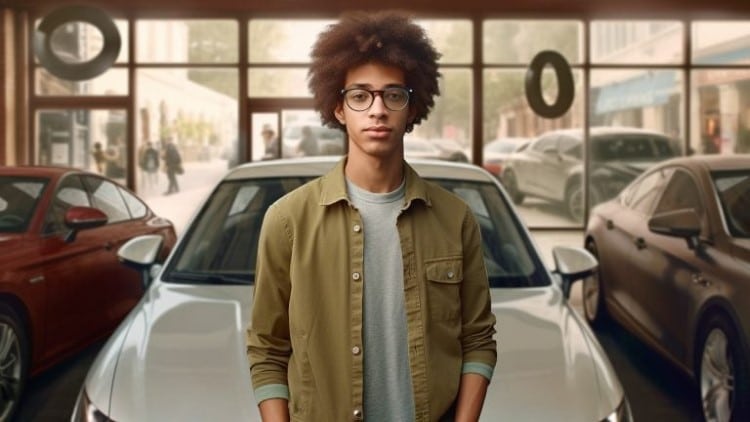AI Visualizes Drivers Based on Car Brands, Reveals Stereotypes Pushed by Technology

Recent experiments with AI generators have highlighted the incredible bias that exists in the technology. Recently, the automotive website Rerev decided to conduct its own test on the stereotypes pushed by AI. To do so, they asked ChatGPT to describe the average owner of 10 popular car brands. Then, they used those descriptions as prompts in Midjourney to generate an image of these car owners. The results are interesting and eye-opening about how drivers are perceived by AI.
The first obvious issue is that AI only generated images of men, highlighting a strong gender bias in the automotive world. Each car owner had their nationality tied to the origins of the brand. So, the Ferrari owner is Italian, while the Honda and Toyota owners are Japanese. These nationalities were selected outside of any specific description written by ChatGPT.
In the case of Volkswagen, AI solely focused on the brand's association with van life by depicting a man with a more bohemian look. This choice clearly overlooks different models of Volkswagens and their owners, who likely live more conservative lifestyles.
Similarly, the Chevrolet and Ford owners both have a rugged, All-American look to them. While these American brands are certainly connected to working-class culture, there are also plenty of owners who live in urban settings and don't have a pick-up truck.
As with all of these AI series, it's important to think deeply about why the technology gave specific results and what this means about our own personal bias.
This is how AI perceives the drivers of 10 common car brands.
Volkswagen

According to Rerev, ChatGPT felt that VW owners “tend to be associated with a quirky and eco-conscious lifestyle. Their laid-back demeanor and casual style reflect a carefree attitude toward life.”
Adjectives ChatGPT used:
- Quirky
- Eco-conscious
- Laid-back
- Casual
- Bohemian
- Liberal
- Hip
- Outdoorsy
- Carefree
- Alternative
Toyota

AI described Toyota owners as people who value practicality and reliability over extravagance. According to ChatGPT, “their sensible appearance and family-oriented mindset reflect their preference for dependable transportation.”
Adjectives ChatGPT used:
- Sensible
- Practical
- Dependable
- Efficient
- Average
- Family-oriented
- Nondescript
- Conservative
- Unadventurous
- Reliable
Ferrari

AI certainly honed in on the wealth of Ferrari owners and their love for luxury and extravagance. In fact, ChatGPT summed up the common perception of these luxury car owners quite well, stating, “their flamboyant appearance and showy lifestyle are seen as expressions of their indulgence and desire to display their affluence.”
Adjectives ChatGPT used:
- Wealthy
- Flamboyant
- Showy
- Extravagant
- Ostentatious
- Attention-seeking
- Spoiled
- High-maintenance
- Indulgent
- Status-conscious
Ford

Ford is certainly known as an All-American car brand, and ChatGPT picks up on this. The technology describes Ford owners as “hardworking and down-to-earth individuals.” It goes on to say that “their rugged appearance and practical style reflect their blue-collar roots.”
Adjectives ChatGPT used:
- Blue-collar
- Rugged
- Practical
- Traditional
- Hardworking
- Patriotic
- Down-to-earth
- Conservative
- Tough
- No-nonsense
Tesla

Perhaps due to its association with new technology and Silicon Valley, Tesla is the one brand that showed a younger car owner. AI writes that “their futuristic style and interest in cutting-edge technology reflect their inclination towards innovation.”
Adjectives ChatGPT used:
- Tech-savvy
- Affluent
- Forward-thinking
- Eco-conscious
- Futuristic
- Geeky
- Progressive
- Modern
- Innovative
- Elitist
Chevrolet

Chevrolet is described in a manner that is similar Ford, the other American car brand on the list. ChatGPT says, “Chevrolet owners exude an all-American, rugged vibe. Their dependable and strong presence aligns with the brand’s deep roots in American automotive culture.”
Adjectives ChatGPT used:
- All-American
- Rugged
- Trucker
- Patriotic
- Working-class
- Traditional
- Dependable
- Outdoorsy
- Country
- Strong
BMW

BMW owners got a bit of a bad rap when described by AI. ChatGPT wrote that they have an air of entitlement and superiority, often placing too much value on status and luxury.
Adjectives ChatGPT used:
- Arrogant
- Slicked-back hair
- Flashy
- Entitled
- Polished
- Smug
- Aggressive
- Snobbish
- Ostentatious
- Overconfident
Honda

Due to Honda's reputation for manufacturing affordable and reliable cars, ChatGPT views their owners as practical and modest individuals who are less focused on having a car with luxury features.
Adjectives ChatGPT used:
- Practical
- Economical
- Average
- Unassuming
- Reliable
- No-frills
- Conservative
- Middle-of-the-road
- Modest
- Efficient
Audi

Audi owners are viewed as trendsetters who love technology and modern aesthetics. According to ChatGPT, “Audi’s reputation for precision engineering and sleek designs contributes to the perception of Audi owners as meticulous and modern individuals.”
Adjectives ChatGPT used:
- Tech-savvy
- Trendy
- Yuppie
- Hipster
- Clean-cut
- Urban
- Fashion-forward
- Meticulous
- Modern
Mercedes Benz

Dubbed pretentious and elitist, AI didn't have entirely positive things to say about Mercedes owners. Associating the brand with wealth and status, ChatGPT said that their “well-groomed appearance and refined style reflect their inclination towards projecting an image of sophistication.”
Adjectives ChatGPT used:
- Middle-aged
- Pretentious
- Conservative
- Well-groomed
- Refined
- Aloof
- Sophisticated
- Well-dressed
- Status-conscious
- Elitist
Rerev: Website
My Modern Met granted permission to feature photos by Rerev.
Related Articles:
This Is What AI Thinks People Look Like Based on Their Job
This Is What AI Thinks People From Each of the 50 U.S. States Look Like
This Is What AI Considers a “Beautiful Woman” in 100 Different Countries
AI’s Version of the “Perfect” Person Is an Eye-Opening Look at Unrealistic Beauty Standards
READ: AI Visualizes Drivers Based on Car Brands, Reveals Stereotypes Pushed by Technology
0 Commentaires